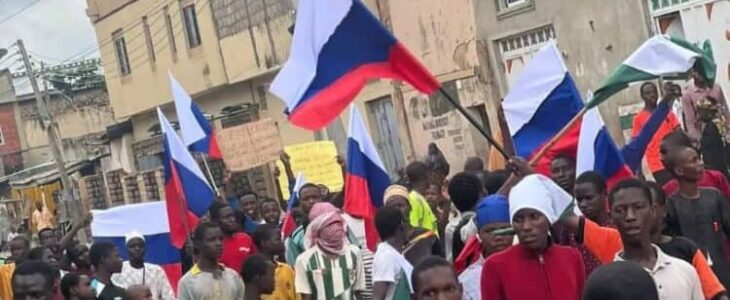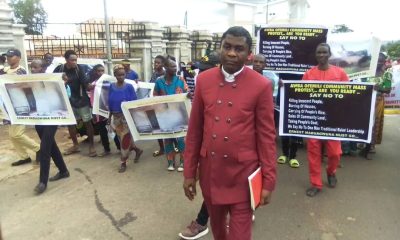OPINION
Troubling Symbolism Of Russian Flags At #EndBadGovernance Protests In Nigeria

BY ISAAC ASABOR
In recent days, Nigeria’s #EndBadGovernance protests have taken an unexpected turn, with some demonstrators proudly displaying the Russian flag. While the protesters’ intentions may be to invoke international solidarity against corruption and mismanagement, this display raises serious concerns about the implications and symbolism of such actions.
The reasons for concern have been expressed not only by this writer, but also by the Chief of Defence Staff (CDS) General Christopher Musa, the leadership of the Russian Embassy in Nigeria, and other Nigerians who are undoubtedly well-versed in the implications of some Nigerians waving Russian flags during protests in Nigeria, particularly in Kano.
Undoubtedly exacerbating the collective fear that the action has already instilled in many Nigerians is Russia’s increased activity across Africa, frequently interfering with internal crises through military support and political manoeuvring. From Libya to the Central African Republic, the Kremlin has formed alliances that allow regimes to maintain power and suppress dissent. Russian mercenaries, particularly the Wagner Group, have gained notoriety for their roles in exacerbating conflicts, undermining local governance, and even violating human rights. As these patterns emerge, the significance of waving Russian flags in a country like Nigeria, where governance issues are widespread, cannot be overlooked.
For some protesters, waving the Russian flag may represent a call for alternative support against entrenched power structures. However, such a gesture blurs the distinction between seeking accountability and courting an external power with a history of opportunism in Africa. Countries such as Sudan and the Central African Republic have found themselves closer to Russia, often with negative consequences for internal stability and governance.
In fact, Nigeria, with its abundant resources and vibrant population, should be wary of portraying itself as a willing partner to a foreign power that thrives on disorder. The history of Russian involvement in other African countries reveals a pattern: alliances formed in the name of support frequently result in the further entrenchment of problems rather than solutions.
There is no doubt that engaging with Russia can have dire consequences. In Libya, the Russian presence has altered the conflict landscape, complicating peace efforts and leading to additional bloodshed. Similarly, the Central African Republic, which is plagued by violence and insecurity, has seen its governance deteriorate under Russian influence. This historical context serves as a cautionary tale for Nigeria, which already has severe governance issues.
As Nigerians become increasingly frustrated with corruption and poor leadership, embracing any external force, even if it appears to be supportive, can have long-term consequences. As a result, the pursuit of better governance should be based on empowering local voices and institutions rather than relying on foreign powers whose interests may not align with the nation’s long-term stability.
As the #EndBadGovernance movement works to rally public support against mismanagement, its leaders must promote a narrative that emphasises national sovereignty, accountability, and genuine reform. While international solidarity is critical, Nigeria must tread carefully to avoid courting influences that could fuel further unrest and conflict.
In fact, flag-waving at protests should be a cause for reflection rather than celebration. Nigeria’s path to recovery and governance reform must begin from within, championing local solutions while remaining wary of external influences that have historically exacerbated African governance crisis.
Furthermore, the display of the Russian flag at Nigerian protests is more than just a harmless symbol of discontent; it serves as a reminder of the dangers that foreign interference can bring. In light of the foregoing, it is reasonable to believe that as Nigeria addresses its internal issues, the emphasis should remain on building a resilient, self-sufficient nation free of the shadows of imperialism and external interference.
To underscore the fact that the development is undoubtedly concerning and worrisome, it is worth noting that the Russian Embassy in Nigeria has distanced itself from the display of the Russian national flag in Kano.
According to the Embassy’s statement in Abuja, the Russian Federation’s government and any Russian officials are not involved in these activities and do not coordinate them in any way, while emphasising that Russia does not interfere in the domestic affairs of foreign states, including Nigeria.
The Embassy also stated that Russia respects Nigerian democracy and believes that peaceful demonstrations in accordance with Nigerian law are a form of democracy.
It also states that the intentions of some protesters to wave Russian flags are personal choices and do not reflect any official position or policy of the Russian government on the subject.
In the same vein, the Nigerian military has condemned the protesters’ activities, warning that they are treasonous and punishable by death.
General Christopher Musa, Chief of Defence Staff, issued the warning on Monday following a security meeting with President Bola Tinubu at the Presidential Villa.
He stated, “We have all seen foreign flags flown within the borders of Nigeria, which is completely unacceptable. We are issuing a clear warning, and the President has instructed us to do so: we will not tolerate anyone, any individual, flying a foreign flag in Nigeria. That is a treasonable offence, and it will be treated accordingly. Nobody should allow themselves to be used by another person.”
“We wanted to brief Mr. President on the situation on the ground, and we know that since the riots began, all security agencies have been cooperating. Initially, the riots were described as peaceful, but we have discovered that there are individuals who are willing to exploit the situation to cause havoc. And we can clearly see what has happened since it began: criminals have taken over, with a lot of looting, stealing, and other illegal activities taking place,” Mr. Musa added.
Simply put, the issue has sparked widespread concern among citizens and observers, emphasising the need for Nigeria’s federal government to conduct a thorough investigation into the circumstances surrounding this incident. Such displays can have far-reaching consequences for national security and public sentiment, particularly given the current geopolitical climate. To address any potential threats to Nigeria’s unity and integrity, the government must first understand the motivations behind this act, which could stem from political affiliations, ideological support, or external influences.
Despite the fact that the State Security Service (SSS) has announced the arrest of several tailors who allegedly sewed the Russian flags that were distributed and waved during the #EndBadGovernance protest in Kano state, it is not a misnomer in this context to urge the federal government to go beyond the arrest of tailors who may not know what was behind and beneath the sewing of the flags other than making money for themselves amid the toothy economy that is biting ever since
Without sounding too patriotic in this context, it is important for every Nigerian to understand that the display of a foreign flag in any part of the country raises serious concerns about loyalty and the influence of international entities within Nigeria. As a result, the Russian flag, in particular, could represent support for controversial policies and actions that may conflict with Nigeria’s democratic values or foreign relations.
In light of the foregoing, there is no denying the importance of conducting an investigation, not only to identify the individuals or groups involved, but also to assess the broader implications of such activities. This will also help to reassure citizens about the government’s commitment to preserving national sovereignty and addressing any dissenting voices that threaten Nigerian democracy.
Finally, transparency in this investigation will increase trust between the government and its citizens. It is critical that the federal government communicate openly about its findings and respond appropriately to any identified issues. The government can work towards a more united Nigeria by actively engaging the public and taking firm action against any entities that promote divisive foreign ideologies. Maintaining the rule of law and reinforcing the nation’s commitment to its core values is critical to ensuring that actions like waving foreign flags do not jeopardise our collective identity or stability.
-
CRIME3 years ago
PSC Dismisses DCP Abba Kyari, To Be Prosecuted Over Alleged $1.1m Fraud
-
FEATURED3 years ago
2022 Will Brighten Possibility Of Osinbajo Presidency, Says TPP
-
FEATURED2 years ago
Buhari’s Ministers, CEOs Should Be Held Accountable Along With Emefiele, Says Timi Frank
-
BUSINESS & ECONOMY2 years ago
Oyedemi Reigns As 2023’s Real Estate Humanitarian Of The Year
-
SPORTS1 year ago
BREAKING: Jürgen Klopp Quits Liverpool As Manager At End Of Season
-
SPORTS2 years ago
Could Liverpool Afford Kylian Mbappe For €200 million? Wages, Transfer Fee
-
ENTERTAINMENT2 years ago
Veteran Nigerian Musician, Basil Akalonu Dies At 72
-
FEATURED2 years ago
Tribunal Judgement: Peter Obi Warns Of Vanishing Electoral Jurisprudence, Heads To Supreme Court
-
BUSINESS & ECONOMY2 years ago
Oyedemi Bags ‘Next Bulls Award’ As BusinessDay Celebrates Top 25 CEOs/ Business Leaders
-
FEATURED3 years ago
2023 Presidency: South East PDP Aspirants Unite, Demand Party Ticket For Zone































